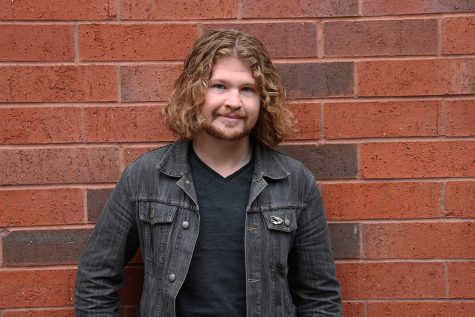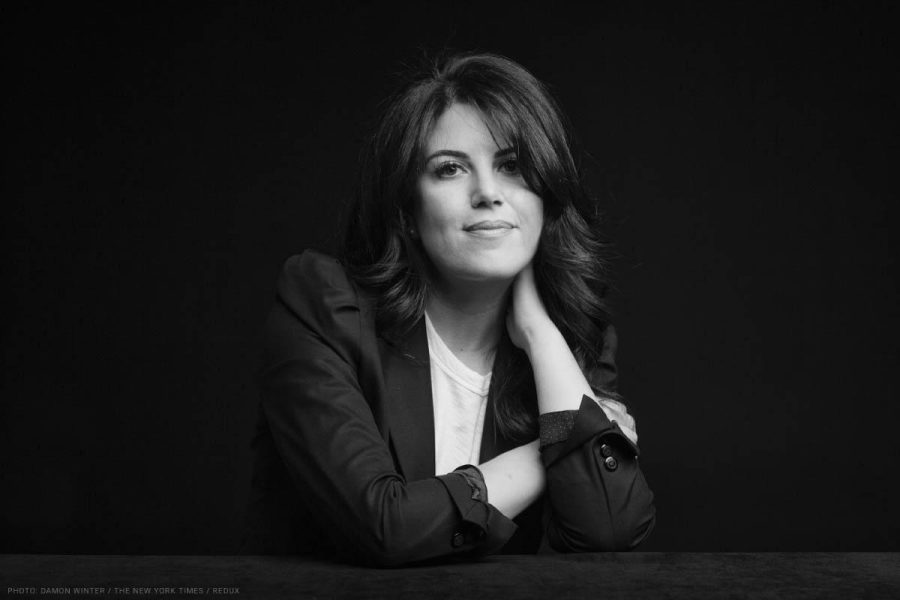Monica Lewinsky visits UW-Eau Claire
In the Forum Series’s opening for the year, Lewinsky explored social media and bullying
Photo by SUBMITTED, UWEC
Lewinsky will open UW-Eau Claire’s 80th Forum series on Oct. 26.
On Wednesday, Oct. 26, Monica Lewinsky spoke in Zorn Arena as the first guest in UW-Eau Claire’s Forum Series.
With an introduction from student Luke Plagens, the event featured a “fireside chat” arrangement and was moderated by criminal justice professor Justin Patchins, who asked Lewinsky about her experiences and relayed community-submitted questions in a conversational format.
Throughout the talk, Lewinsky recounted personal experiences with ostracization and explained her return to the public eye, as well as her later experiences with anti-bullying activism.
The forum opened with Lewinsky’s experimental short film “The Epidemic” which portrayed bullying in a school setting.
Lewinsky began her speech with an account of her 1997 White House scandal and the immediate fallout of the event. She recounted how this event made her into a widely vilified public figure.
Lewinsky said that during this time she was seen “very one-dimensionally.”
Much of Lewinsky’s talk was an account of her experience returning to the public stage after a period of ostracization during which she could not leave her house or find employment.
The key to this re-emergence, Lewinsky said, was a combination of factors that included family, therapy and psychiatry as well as other realizations.
“I’m a big fan of using all tools available for mental health,” Lewinsky said.
She also said that a major part of recovery was not linear, but that “things actually get better.”
A turning point in her return to the public eye, Lewinsky said, was when a former professor pointed out that there was “no competing narrative” for her story which ultimately inspired her to provide her own account.
This reclamation of her narrative came in the form of a first-person essay titled “Shame in Survival” in Vanity Fair in which Lewinsky told her side of the story and signaled a re-emergence into the public scene.
At this point in her life, Lewinsky stated reactions for her were still hesitant and expressed gratitude for the support of her mother.
“I wasn’t sure if people would let me participate,” Lewinsky said.
She recalled in her talk that what followed at this time was a series of public engagements, including a talk with Forbes and a TED Talk entitled “The Price of Shame,” after which she was offered a job with anti-bullying organization Bystander Revolution by Jeff Bezos.
It was also around this time, Patchin said, that he and Lewinsky met at a conference.
At this point in the forum, Lewinsky moved towards a discussion of her experience with and views of social media and the way it interacts with bullying, including a campaign with advertising network BBDO New York and an effort with Vodafone involving anti-bullying emojis.
Lewinsky also offered key advice to those in a school setting struggling with bullying, encouraging victims to reach out to friends and family and to tell somebody what is happening.
“There is no shame in asking for help,” she said.
She also reflected on areas of improvement in the state of social media, suggesting that social media companies are “doing more” for people but nonetheless sometimes turn a blind eye and that bullying victims are often left in a difficult position with few legal rights or protections.
Lewinsky also responded to more pre-submitted questions, conveyed by Patchin, providing insight into issues she sees as needing more attention in the world (bodily autonomy) and how to foster compassion (small gestures are key).
She concluded her speech by providing two things that give her hope: seeing “moments of unbelievable kindness” on social media and her niece and nephew.
“I see the light in them,” Lewinsky said.
Overall, Lewinsky’s forum was received very positively by the community, with many attendees remarking that the speech was very enlightening.
“I thought Monica Lewinsky was terrific,” Andrew Estren, an usher at the event, said. “I enjoyed it.”
The event was attended not only by UW-Eau Claire students, but also by a vast array of community members.
“I didn’t realize that she was actually kind of in the same generation. I always thought that she was so much older,” Jeremy Gragert, a member of the Eau Claire City Council, said. “I feel like I’m able to relate to her more because she’s actually probably only a couple years older than me.”
The lecture was followed by an informal reception in Centennial Hall, during which attendees were provided with refreshments and were able to chat with Lewinsky.
Flake can be reached at [email protected].

Liam Flake is a third-year English literature and journalism student and this is his third semester on The Spectator. His passions include reading, tea, corvids and maps. He aspires to travel the world in a van and write about the experience. In his free time Flake can be found in the library or around town in a hammock.











